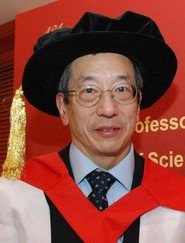
Professor Roger Yonchien Tsien was born in 1952 in New York City to a family that is distantly descended from King Qian Liu (Tsien Liu) of Wuyue in China. His extended family includes many engineers, including a father who was a mechanical engineer, uncles who were engineering professors at the Massachusetts Institute of Technology, and his father's cousin, the missile expert Tsien Hsue-sen (Qian Xuesen).
At age 16, Professor Tsien won first prize in the US nationwide Westinghouse Science Talent Search with a project on inorganic chemistry. He later attended Harvard College on a National Merit Scholarship and graduated in 1972 with a degree in Chemistry and Physics.
He received his PhD in Physiology in 1977 from the University of Cambridge and stayed on as a Research Fellow. In 1981, he left for the University of California, Berkeley, and an eventual professorship there. In 1989 he moved to the University of California, San Diego, where he was an Investigator of the Howard Hughes Medical Institute and Professor in the Departments of Pharmacology and of Chemistry and Biochemistry.
In 2008, Professor Tsien was named a co-recipient of the Nobel Prize in Chemistry for his contributions to the discovery and development of the green fluorescent protein (GFP). His work with GFP opened a vast set of pathways and opportunities for studying biological processes at the molecular level. GFP and its relatives provide a visual signal that scientists have learned to use in many ways to probe protein activity, such as when and where proteins are produced and how different proteins or parts of proteins move and approach each other within a cell. He is now developing new ways to target contrast agents and therapeutic agents to tumour cells based on their expression of extracellular proteases.
Professor Tsien was a co-founder of Aurora Biosciences Corporation, which used GFP and other fluorescent probes for high-throughput drug screening, and of Senomyx, a company using such screening technology to discover flavour modifiers.
Professor Tsien has received numerous awards for his work and is a member of the Institute of Medicine, the American Academy of Arts and Sciences, the US National Academy of Sciences, and in the United Kingdom, the Royal Society.
In recognition of his contributions to the fields of cell biology and neurobiology, the University has resolved to confer upon him the degree of Doctor of Science honoris causa.




